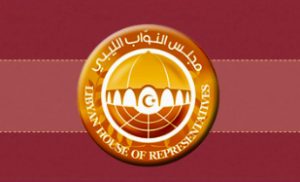By Sami Zaptia.

London, 27 December 2021:
During the part of its session broadcast live today, the House of Representatives (HoR) was unable to reach agreement on progress towards another election date. While some members wanted to make progress and look forward, many were more interested in placing blame for the postponement of Libya’s 24 December 2021 elections.
In the early session cameras were turned off as security reports on the elections were read out to members. Parts of these reports were revealed by members during their intervention.
In its first session since the passing of 24 December and the failure to hold the promised elections, the HoR claimed that over 120 members had attended, which is a high turnout and indicates broad participation across political and regional divides.
The interventions by members could be summarised as follows:
- The date of 24th of January 2022 suggested by the High National Elections Commission (HNEC) as a possible new date for Libya’s postponed elections is an unrealistic date for holding the next elections. This, members felt, because some of the causes of the postponement of the 24th of December 2021 elections would still there and would not be removed by the 24th of January. These included the causes that were revealed in the closed session by the security agencies.
- It was suggested that the HoR come up with a new political Road map.
- Some members blamed Abd Alhamid Aldabaiba government in its role as executive for the failure of the elections to be held on time. They blamed it for failing to create the right climate.
- Some MPs called for the formation of a new government and considered the term of the current government over.
- Some MPs suggested that there should be an amendment of the draft constitution and that they should come up with a consensual constitution.
- Those who considered HNEC to be the cause of the postponement of the elections called for HNEC head Emad Sayeh to be called to account for his actions and decisions. Some made a stronger demand that Sayeh be investigated.
- Some just wanted a more detailed and less vague report from HNEC spelling out the causes of the postponement.
- Some members called for the disbanding of the current HNEC and the formation of a new one with a new head.
- Some members reminded that it was not the HoR that chose the 24th of January as the election date.
- Some members laid the blame on the UN created and selected Libyan Political Dialogue Forum (LPDF). They said the elections had failed to be held on time when the LPDF failed to come up with constitutional basis for the elections.
- HNEC was criticised for accepting all candidates with missing criteria. Some members felt they misinterpreted how to operate and should not have accepted their files in the first place. They should not have ‘‘passed the buck’’ and referred them to the courts.
- HNEC head Emad Sayeh had cited ‘‘force majeure’’ as one of his reasons for postponing the elections, but he did not spell out what this force measure was. Members wanted it spelled out.
- One member blamed pressure by the USA on HNEC head Emad Sayeh into postponing the elections. They did not want Saif Qaddafi running in the elections who had been reinstated as a candidate by the courts after HNEC had initially disqualified him.
- Another member pointed out that Stephanie Williams is an advisor on Libya to the UN Secretary General and not in stewardship over Libya.
- One HoR member said the elections failed to be held because the USA, UK and Russia want to force their own political views on Libya.
- Others said all foreign forces must be removed from Libya so that there can be fair and free elections.
- Others said the conditions for elections include a (state controlled, non-militia) army to secure the ballot box and polling stations and elections.
- Others said there needs to be a constitutional basis, a consensus and national reconciliation before elections can be held.
Why were elections postponed?
- Members revealed that HNEC / the Security agencies had reported that some voting cards went missing or were not delivered to the correct polling stations or to their owners and that there were between 250,000 to 700,000 fake National ID numbers.
- Some suspected of crimes had registered as parliamentary or presidential candidates.
- Some candidates had fake information or data on their application forms. Some had false sponsors.
The session ended in disruption when the acting Speaker suggested a vote on what he saw as the only three conclusions reached by the various speakers throughout the session. Many members objected to a vote or to not having had the chance to speak yet. The television transmission was then suddenly cut.
HoR creates committee for a new post-24 December 2021 roadmap | (libyaherald.com)
UNSMIL warns that political tensions should be resolved through dialogue | (libyaherald.com)






